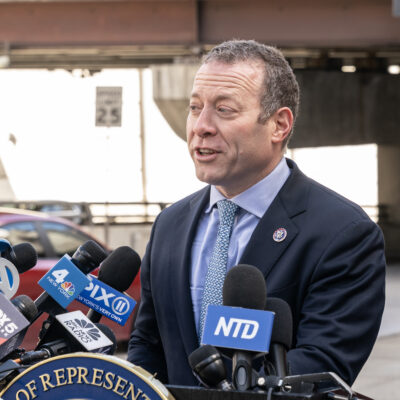House Democrats split again over new Iran funding vote
The House passed two other bills, sanctioning the Iran-China energy trade and penalizing Hamas-supporting tax exempt organizations, with just 11 lawmakers opposing

ATTA KENARE/AFP via Getty Images
A picture taken on November 10, 2019, shows an Iranian flag in Iran's Bushehr nuclear power plant, during an official ceremony to kick-start works on a second reactor at the facility.
The House Democratic caucus split in half again on Monday over a vote aiming to further restrict potential U.S. and international financing for Iran.
Rep. Bill Huizenga’s (R-MI) “No U.S. Financing for Iran Act” passed by a 294-105 vote, with 88 Democrats supporting the bill and 104 opposing it; Rep. Thomas Massie (R-KY) was the GOP’s sole vote in opposition. Democrats split along similar margins on another measure restricting funding to Iran last November.
The bill would prohibit any U.S. financial institution from transactions with Iran (except those of a humanitarian nature), direct the administration to oppose the provision of financial assistance to Iran at the International Monetary Fund and prohibit the Export-Import Bank from providing financing to projects involving Iran.
Among Democrats, the vote breakdown didn’t fall cleanly along ideological lines, although most of the party’s more moderate members voted for the bill, while most of its more progressive members voted against it. All three top Democratic leaders opposed the bill.
Rep. Emmanuel Cleaver (D-MO) claimed during the floor debate that the legislation would do little to counter Iranian terror financing but would “deny assistance to every developing country in the world and halt financing for small businesses at the Export-Import Bank.”
He said the bill would damage the U.S.’s standing at the IMF and undermine the institution, as well as place burdensome requirements on the Export-Import Bank, accusing Republicans of seeking to undermine the institution.
Huizenga said the bill “stops Iran from being able to use the U.S. financial system while ensuring that institutions under our committee’s jurisdiction keep their distance from the government in Tehran.”
Two other bills relating to the conflict in the Middle East passed with near-unanimous bipartisan support, with only a small group of anti-Israel members in opposition.
The “Iran-China Energy Sanctions Act,” led by Reps. Mike Lawler (R-NY), Josh Gottheimer (D-NJ), Byron Donalds (R-FL) and Barry Loudermilk (R-GA), passed by a 383-11 vote.
Democratic Reps. Jamaal Bowman (D-NY), Cori Bush (D-MO), Greg Casar (D-TX), Chuy Garcia (D-IL), Summer Lee (D-PA), Alexandria Ocasio-Cortez (D-NY), Ilhan Omar (D-MN), Ayanna Pressley (D-MA), Delia Ramirez (D-IL) and Rashida Tlaib (D-MI) and Republican Massie voted no.
The bill would place sanctions on all Chinese financial institutions that engage in transactions with sanctioned Iranian financial institutions relating to the oil trade, primarily targeted at small refineries inside China.
A bill led by Reps. David Kustoff (R-TN) and Brad Schneider (D-IL) to strip tax exempt status from any group providing “material support or resources” to Hamas or other designated terrorist groups passed by a 382–11 vote. The bill would not apply to organizations expressing rhetorical support for Hamas.
Bowman, Bush, Garcia, Lee, Ocasio-Cortez, Omar, Pressley, Ramirez, Tlaib and Massie, as well as Rep. Jan Schakowsky (D-IL) opposed the bill
The House is set to vote on more than a dozen other bills and resolutions relating to Iran and Israel before the end of the week, including an aid package for Israel.










